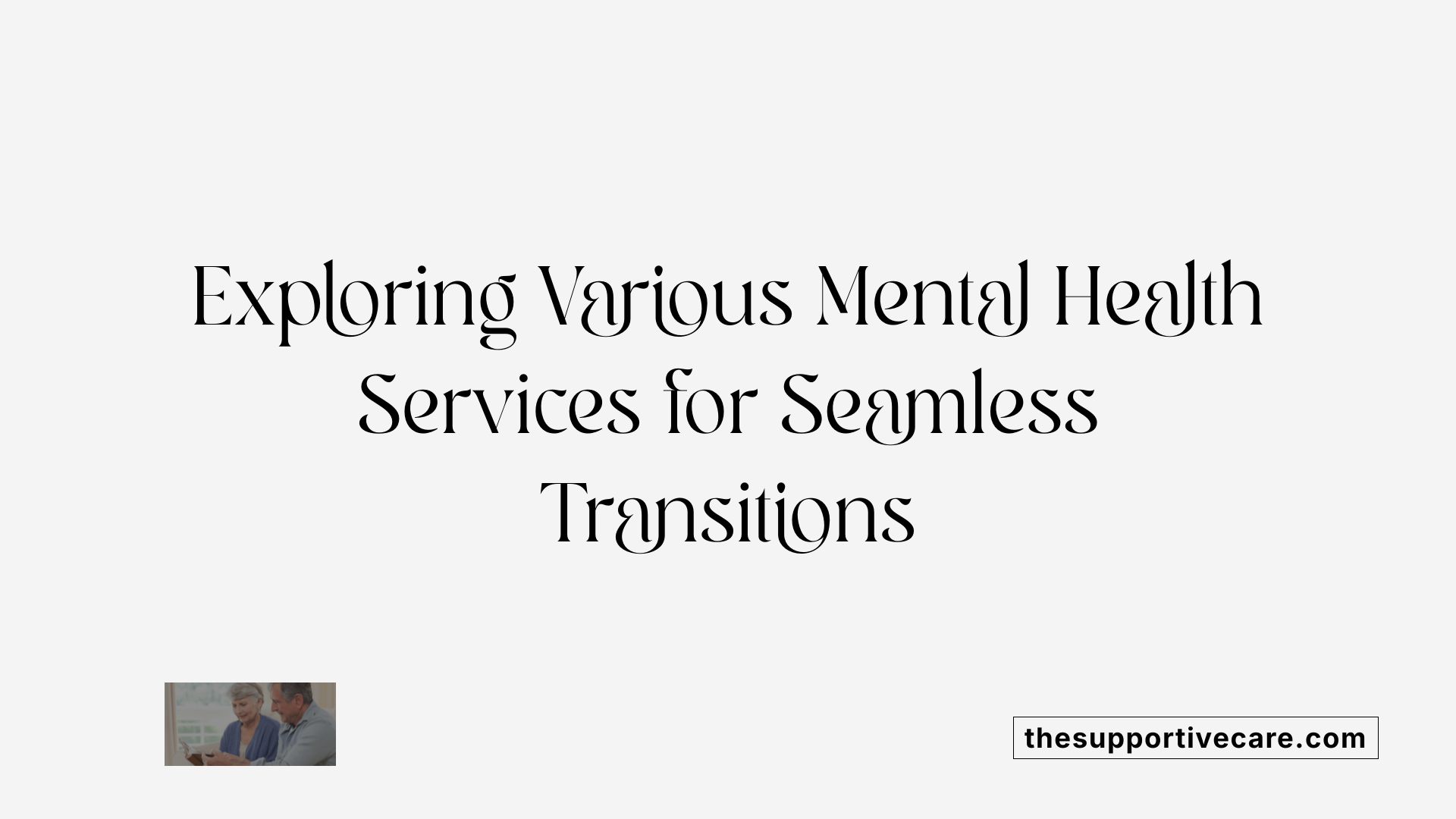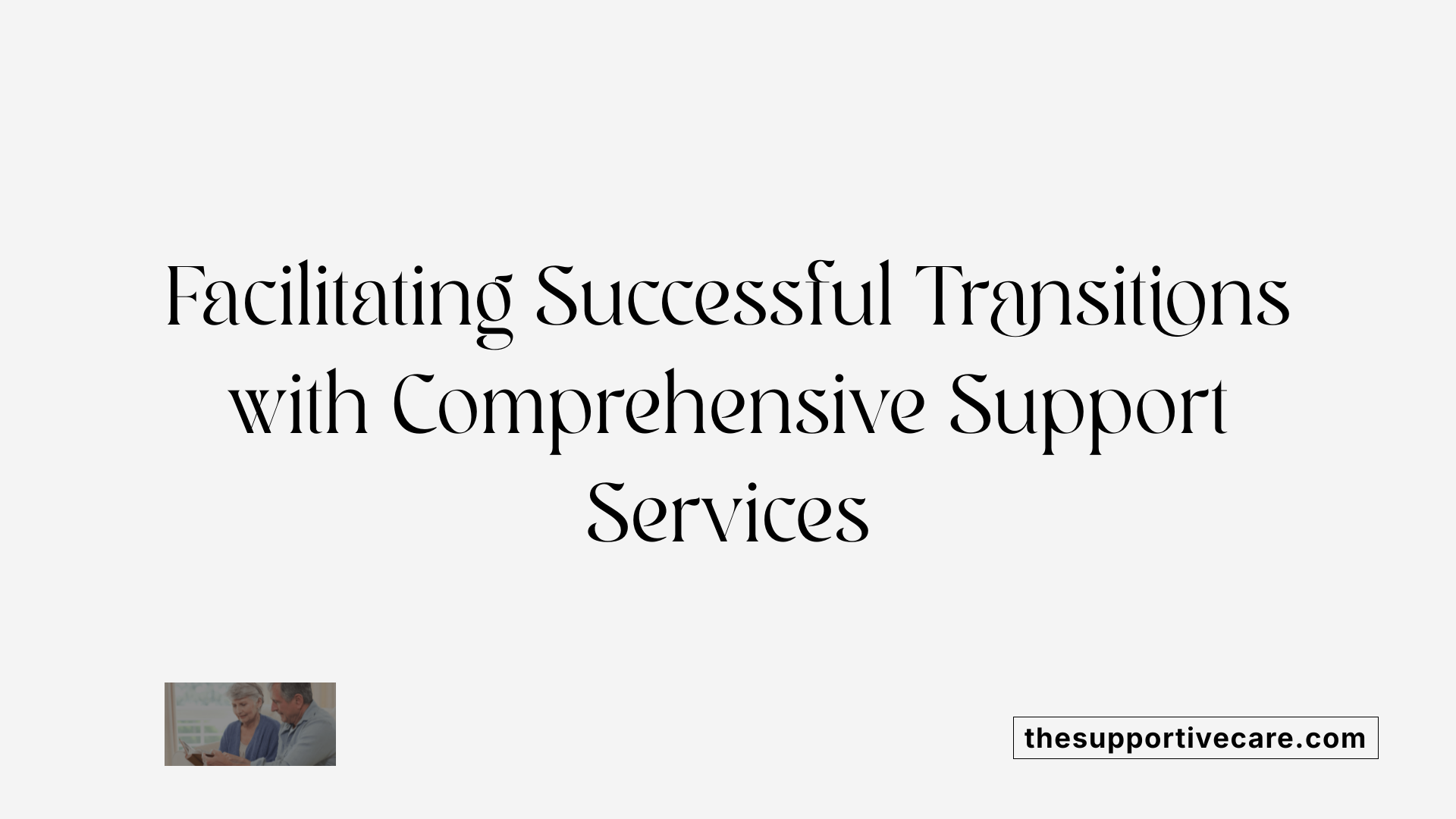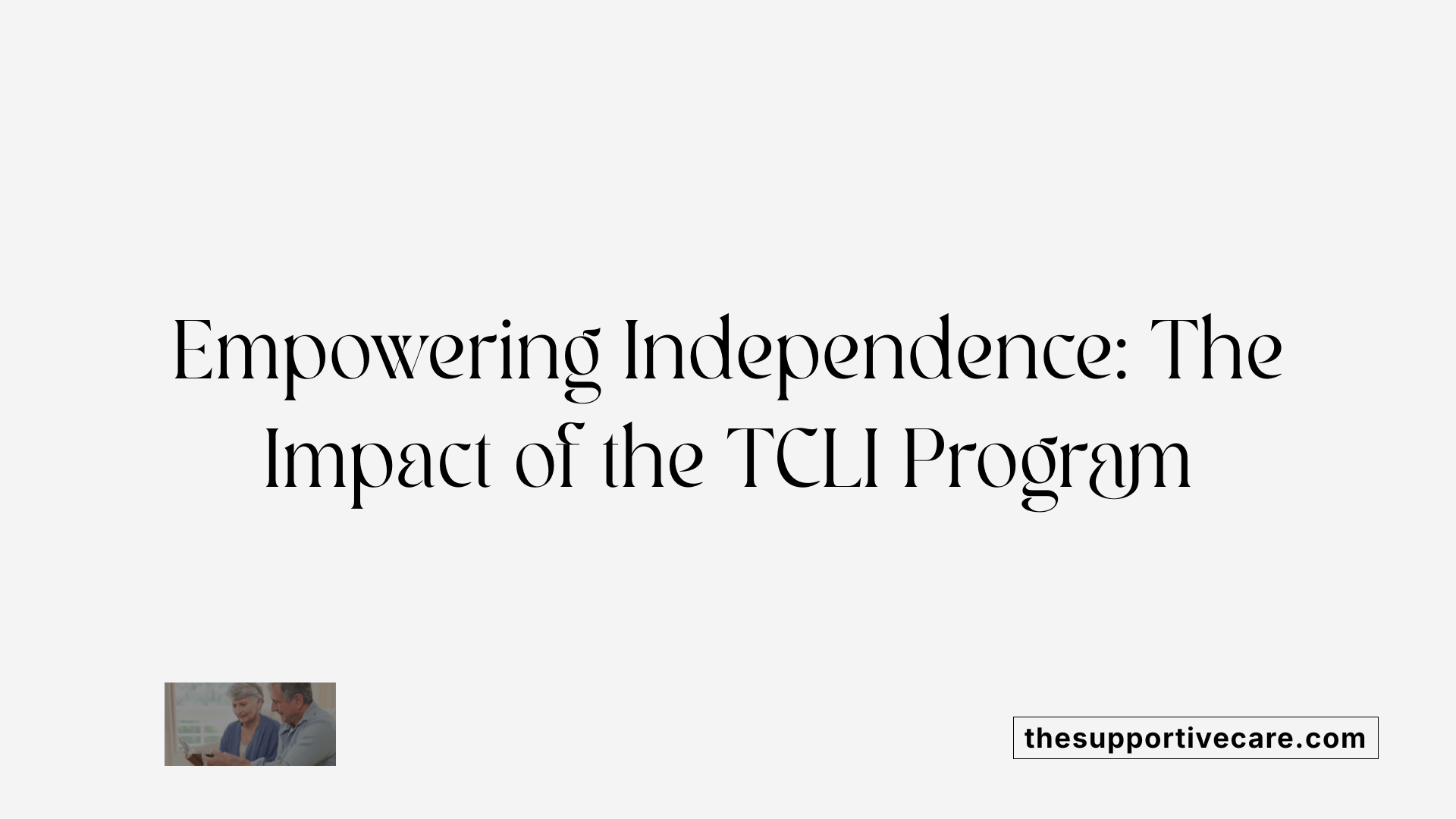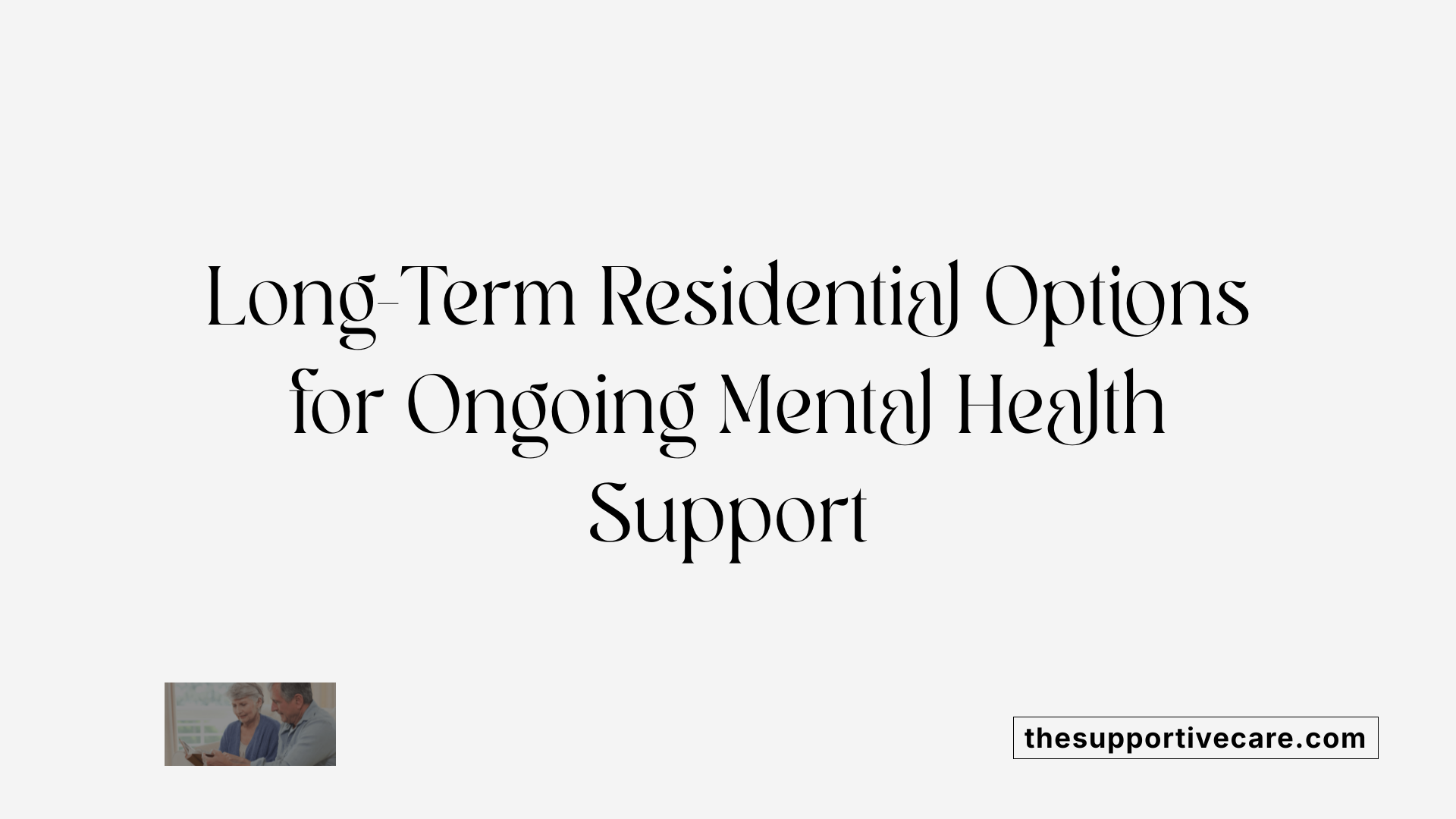Understanding Key Services for Facility Transition Support
Transitioning into facility or community living is a complex process that requires comprehensive behavioral health services designed to foster stability, independence, and community integration. Various programs and models work collaboratively to ensure individuals with mental health conditions move seamlessly from hospitals, institutional settings, or homelessness into supportive living environments. This article explores the diverse array of services and initiatives that ease these transitions, emphasizing evidence-based practices, community partnership efforts, and tailored treatment environments.
Types of Mental Health Services Facilitating Transitions

What are the main types of mental health services used to support transitions into care facilities?
Supporting individuals with mental health conditions as they move into various care settings requires a range of specialized services. Each type addresses specific needs, ensuring smooth and effective transitions.
Inpatient psychiatric hospitals and mental health facilities are often the starting point for severe cases. These hospitals provide intensive, round-the-clock care for individuals experiencing acute psychiatric crises or requiring long-term treatment. They serve as a critical stage before moving to less restrictive environments.
Community-based outpatient programs and crisis services play a vital role in maintaining stability and preventing hospitalization. These services include mental health clinics, crisis intervention teams, and crisis stabilization centers that offer immediate support and ongoing outpatient treatment. They help individuals manage symptoms and transition gradually back into their communities.
Residential treatment programs provide structured, longer-term accommodations tailored to individuals needing intensive support outside traditional hospital settings. Supported housing options, such as group homes and supported apartments, enable residents to develop daily living skills and foster independence while receiving mental health supports.
Partial hospitalization and day treatment programs serve as intermediate solutions. They offer structured care during the day, allowing clients to participate in therapy, skill-building activities, and medical management, all while returning home at night. This model supports step-down transitions from inpatient care or step-ups from outpatient settings.
Each of these service types is staffed by licensed mental health professionals committed to ensuring that individuals receive the appropriate level of support during their transition, ultimately promoting recovery and community integration. Utilizing a combination of these services helps create a comprehensive support system tailored to diverse needs.
Supporting Community Integration During Transitions

How do behavioral health services support community integration during transitions?
Behavioral health services play a vital role in helping individuals smoothly move into the community from institutional or hospital settings. These services are comprehensive and tailored, often including case management, transition planning, and continuous follow-up care to ensure individuals maintain stability and access necessary resources.
Case managers and care teams coordinate housing, employment, and social services, making the transition more manageable. They work closely with individuals to develop personalized plans that foster independence and community participation.
Programs like Assertive Community Treatment (ACT) exemplify evidence-based approaches that support gradual connection-building and skill development. ACT teams provide intensive, community-based services for those with severe mental illnesses, offering support in daily living, medication management, and social engagement.
Culturally competent, collaborative care models further enhance these efforts by involving diverse providers and community stakeholders. This approach reduces barriers related to accessibility and societal attitudes, ensuring care respects individual backgrounds and needs.
Ultimately, these integrated strategies promote not only recovery but also social inclusion and quality of life, aligning with legal mandates like the Olmstead decision that affirms every person's right to live and thrive in their community.
The Role of the Transitional Community Living (TCLI) Program

Overview and goals of TCLI
Transitions to Community Living (TCLI) is a comprehensive initiative aimed at helping adults with serious mental health conditions move from institutional settings into the community. The primary goal is to promote independence, community integration, and recovery by providing supportive housing and mental health services tailored to individual needs.
Housing and support services offered
TCLI offers permanent, affordable, and integrated housing options designed to prevent long-term institutionalization. Participants are supported through services such as supported housing, mental health care, supported employment, and community engagement activities. The program also provides resources like tenancy support toolkits, community support teams, and guides to help individuals thrive.
Eligibility criteria and referral process
Eligible individuals typically have a diagnosis of serious mental illness, are Medicaid beneficiaries, or have income below set thresholds. Those discharged from psychiatric facilities into homelessness or unstable housing are often prioritized. Referrals can be made online, by phone, or through paper forms, and assessments are conducted to verify eligibility and match participants with appropriate supports.
Impact on individuals with serious mental illness
By offering community-based supported housing and evidence-based mental health services, TCLI significantly improves quality of life. Participants gain greater independence, access to employment, and social connections. The program aligns with legal mandates such as Olmstead v. L.C., emphasizing the right to community living. Testimonials reflect increased feelings of support and empowerment, showing the program’s positive influence on recovery and stability.
| Aspect | Details | Additional Info |
|---|---|---|
| Goals | Promote independent living and community integration | Focused on recovery and reducing hospitalization risk |
| Housing options | Permanent, affordable, community-based | Tailored to individual needs |
| Services provided | Mental health, employment, tenancy support | Evidence-based treatments like ACT and IPS |
| Eligibility requirements | Diagnosis of SMI, Medicaid eligibility, prior discharge from hospital | Online or paper referral methods |
| Outcomes expected | Increased independence, social engagement, and stability | Improved quality of life; decreased institutionalization |
This initiative showcases how integrated community support and housing can significantly benefit individuals with serious mental health conditions, fostering recovery, dignity, and full participation in community life.
Residential Environments Supporting Longer-Term Care

What types of residential mental health treatment environments support longer-term care?
Supportive residential environments for mental health extend beyond hospital settings to include various structured living options that promote stability, recovery, and independence. These include psychiatric residential centers, supported living arrangements, group homes, nursing homes, and specialized facilities tailored to individual needs.
Psychiatric residential centers are designed to provide ongoing treatment for individuals with severe mental illness. They often feature a combination of clinical care and community activities, helping residents develop daily living skills while managing their conditions.
Supported living arrangements and group homes offer more independence, focusing on social rehabilitation. Residents typically share homes with staff providing support with daily activities, medication management, and social skills development. These settings aim to foster community integration and reduce stigma.
Nursing homes and specialized residential facilities serve individuals needing more intensive or medical support. They accommodate those with complex medical or psychiatric conditions, ensuring continuous supervision and specialized care through licensed programs.
Community rehabilitation apartments form part of a broader approach that emphasizes independent living supported by outpatient services. They enable residents to practice everyday skills in a real-world environment, with ongoing mental health supports ensuring stability.
Overall, these longer-term residential settings are crucial components of community mental health systems. They provide sustained support, skill-building opportunities, and a structured environment that can prevent hospital readmissions and support an individual’s recovery journey.
Enhancing Transitions through Collaborative and Evidence-Based Care
Effective behavioral health services are essential in facilitating smooth, supportive transitions into facility and community living. By integrating diverse treatment environments, community-based programs, and innovative models like the TCLI and evidence-based discharge practices, these initiatives promote stability, independence, and social inclusion for individuals with mental health conditions. Ongoing collaboration among healthcare providers, policymakers, and community organizations is vital in addressing barriers, expanding access, and ensuring the dignity and well-being of those served. As legislation and research continue to evolve, so too will the strategies to support seamless transitions, ultimately fostering healthier, more inclusive communities.
References
- Mental Health Transitional Living Homes | Colorado Department of ...
- Transitions to Community Living | NCDHHS
- Transitions to Community Living - Partners Health Management
- Behavioral Health Transitional Care Programs
- Transitions to Community Living | Vaya Health
- Evidence-Based Care Transitions Program
- Community Transitions Program - Full Life Care
- Project Transition: Community-Based Behavioral Health Care



































































































